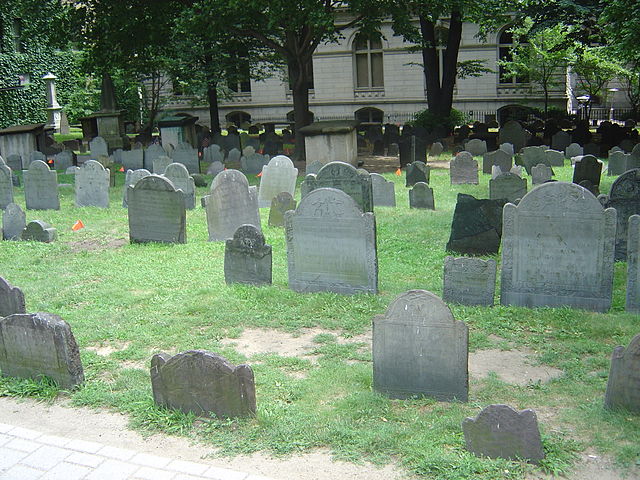The printer Joseph T. Buckingham set down and published Russell’s story “as near as can be recollected”:
It was a part of my duty as an assistant in the domestic affairs of the family, to have the care of the cow. One evening, after it was quite dark, I was driving the cow to her pasturage,—the common. Passing by the burial-ground, adjoining the Stone Chapel, I saw several lights that appeared to be springing from the earth, among the graves and immediately sinking again to the ground, or expiring. To my young imagination, these lights could be nothing but ghosts. I left the cow to find her way to the common, or wherever else she pleased, and ran home at my utmost speed.So nothing to worry about, kids! Just the sexton digging up old bones and glow-in-the-dark coffins to make room for new bodies.
Having told my father the cause of my fright, as well as I was able, while in such a state of terror and agitation, he took me by the hand and led me directly to the spot, where the supposed ghosts were still leaping and playing their pranks near the surface of the ground. My hair rose on end, and seemed to lift my hat from my head. My flesh was chilled through to my very bones. I trembled so that I could scarcely walk. Still my father continued rapidly marching towards the spot that inspired me with so much terror.
When lo! there was a sexton, up to his shoulders in a grave, throwing out, as he proceeded in digging, bones and fragments of rotten coffins. The phosphorus in the decaying wood, blended with the peculiar state of the atmosphere, presented the appearance that had completely unstrung my nerves, and terrified me beyond description.
I was never afterwards troubled with the fear of ghosts.
And since I’ll speak at Old North Church tomorrow about Revolutionary Boston’s schools, here is Buckingham on Russell’s education:
When quite a child Russell was noted for a remarkably retentive memory and more than ordinary facility in learning the tasks prescribed by his teacher. He was placed at the public school taught by Master [James] Carter, whose aptness in teaching and mildness of discipline were somewhat celebrated. Nothing was then taught in the common schools of Boston but the simplest elements of education. The tasks, that Russell had to perform, embraced nothing but easy lessons in reading, writing, and arithmetic.No science, history, geography, or other subjects.

what happened to the cow?
ReplyDeleteI suspect the cow was smart enough to find her way to the grass on the Common.
ReplyDelete